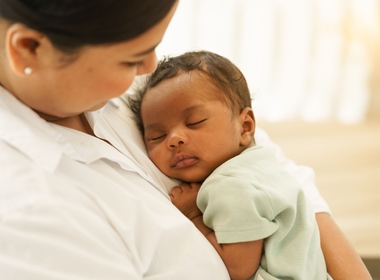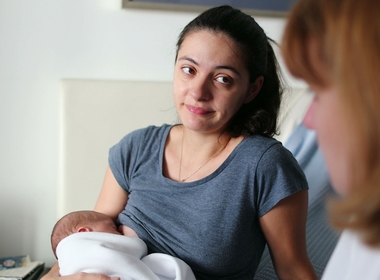Learn about perinatal mental health conditions, including symptoms, causes and support options for new and expectant parents.
Jump to: Perinatal mental health conditions | How common they are | Causes and risk factors | Help and support | Final reminder
Pregnancy and parenthood can be times of joy. However, it is also normal to have overwhelming feelings as a new or expectant parent, and these can be challenging to manage.
Perinatal mental health is the term given to mental health during pregnancy and up to 2 years afterwards. You may also hear it called maternal mental health. Perinatal mental health conditions are common, but they are often not talked about openly.
This page will help you understand different perinatal mental health conditions and their possible causes, and guide you to sources of support if you’re worried about yourself or someone you know.
Some mental health conditions can occur at any time, but others are specific to pregnancy and the postnatal period.
Antenatal depression (depression in pregnancy) and postnatal depression (depression after pregnancy) are among the most common perinatal mental health conditions.
They often involve prolonged feelings of sadness, hopelessness, or a lack of enjoyment in life during or after pregnancy. These feelings can make it hard to care for yourself and look after or bond with your baby.
The first 4 symptoms are sometimes overlooked as ‘normal’ parts of pregnancy or the postnatal period. However, it is important to see a healthcare professional if you feel worried.
It is common to experience the ‘baby blues’ after giving birth, causing you to feel sad, low, or tearful. However, the baby blues and postnatal depression are not the same.
The baby blues usually start within a few days of giving birth and settle within 2 weeks. If you are feeling low for longer, it’s important to seek advice from your midwife, health visitor or GP as these symptoms could be a sign of postnatal depression.
PANDAS Foundation offers various forms of support for people with perinatal depression, including calls with trained volunteers, email or WhatsApp support, and support groups for parents.
Perinatal anxiety involves intense worry or fear, often centred on the health and wellbeing of your baby. You may also worry about your ability to cope with parenting, or doubt how well you are caring for your baby.
Anxiety can lead to physical symptoms and may interfere with your daily life.
Tommy's offers support for mental health before, during, and after pregnancy, including a helpline staffed by midwives: 0800 014 7800 (Mon-Fri, 9am-5pm).
Postpartum psychosis (sometimes called puerperal psychosis) is a rare but serious mental health condition that requires immediate medical attention. It typically develops in the first few days or weeks after giving birth. Symptoms can also begin during pregnancy or later in the postnatal period, but this is even more rare.
Postpartum psychosis is a medical emergency and requires urgent assessment and treatment.
If you are already under the care of the mental health team, call the emergency numbers they have given you, or contact the crisis service.
If you are not already under the care of a mental health team, please speak to your GP, midwife, or health visitor urgently (the same day) or go to your local A&E Department.
The Action on Postpartum Psychosis (APP) website contains information, support and stories to help you understand more about this condition.
Having a difficult, complicated, or upsetting birth can sometimes lead to post-traumatic stress disorder (PTSD) relating to the birth itself.
PTSD can also occur following traumatic experiences before or after birth, such as a high-risk pregnancy, feeding difficulties, or your baby requiring specialist care after birth.
The Birth Trauma Association can offer support following a difficult birth, and Make Birth Better provides free tools to help you cope after a traumatic delivery. Bliss provides support to parents and families of premature or sick babies.
The perinatal period can feel overwhelming for anyone who has or had a disordered relationship with food, body image, or exercise. Pregnancy and the postnatal period often bring new challenges that can trigger or worsen eating disorders.
Wednesday’s Child offers a community for those recovering from eating disorders, with support available for friends and relatives, too.
Perinatal OCD is an anxiety disorder characterised by obsessions and compulsive behaviours that are often carried out to try to reduce the anxious feelings.
The thoughts may involve worries around your baby’s safety, which can be very distressing.
The Maternal OCD website has information and resources for new parents and their families.
Tokophobia is an extreme fear (phobia) of childbirth and, in some cases, pregnancy. While it is normal to feel some anxiety about giving birth, tokophobia is more severe.
It can occur in women and birthing people who have never been pregnant or given birth before (primary tokophobia). This is sometimes linked to experiences from childhood or past sexual abuse.
More commonly, it can occur following a previous difficult birth experience or loss (secondary tokophobia). This is a form of post-traumatic stress disorder (PTSD).
It's important to recognise that tokophobia is a mental health condition that requires support and treatment.
Visit the Tommy’s website for more information about tokophobia.
Having a mental health condition at any time in life is not your fault.
You may feel pressure from society and social media to feel happy and content as a parent, but many people feel tired, worried, or low during pregnancy or after birth.
Perinatal depression, anxiety and other mental health conditions can affect the pregnant or birthing parent, as well as their partner and wider family. Although they’re often not talked about enough, perinatal mental health conditions are more common than some other pregnancy-related conditions you may have heard of:
Condition | Number affected |
| Perinatal mental health conditions | Up to 1 in 4 women and birthing people* |
| 1 in 10 men* | |
| Gestational diabetes | 1 in 20 women and birthing people |
| Pre-eclampsia | 1 to 5 in 100 women and birthing people |
Because perinatal mental illness is so common, it’s important to know the signs. Spotting them early can help you or someone close to you get support as soon as possible.
*There is currently a lack of specific prevalence data and research for trans and non-binary parents.
Perinatal mental health problems can affect anyone. They may result from a combination of biological (physical), psychological (emotional), and social factors.
Sometimes, there is no obvious cause or trigger!
Admit how you are feeling, even if it is really hard.
Jenny
Read more about JennyRecognising the signs and symptoms of perinatal mental health conditions is the first step towards getting support or supporting a loved one.
If you or someone you know is struggling, it’s vital to seek help as soon as you can.
The type of support you need will depend on many factors including your symptoms, condition, past medical history, personal circumstances, and your own preferences. Your GP or mental health team can give advice and make recommendations tailored to you and your family.
To find out more, go to the treatment and support options page.
The Maternal Mental Health Alliance sends heartfelt thanks to the women and clinicians who generously gave their time to review and offer feedback on our information.
Find out more about perinatal mental health, treatment and support.

Discover treatment options for perinatal mental illness, including therapy, medication, peer support, and specialist care.

Find out what support is available and right for you or your loved one.

Discover how fertility challenges and assisted conception can impact perinatal mental health.
Published: May 2025 Next review: May 2028